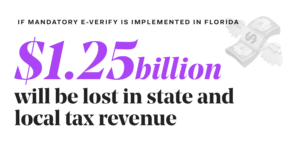Regional Economic Losses
Hospitality and construction businesses will be particularly hard-hit. Accommodation and food service businesses are projected to be the most affected, with more than 79,000 positions lost. Construction follows at 54,500 jobs, with agriculture, retail trade, and healthcare all losing more than 10,000 jobs. Additional losses are spread across other sectors.
Regionally, losses would be felt most acutely in 16 counties in South Florida, where earnings would diminish by $6.2 billion, 145,862 jobs would be lost, and local and state tax revenues would fall by $756 million, relative to values without the implementation of mandatory E-Verify. Large losses would also occur in the 15-county Central Florida region. These losses would include a loss of $3 billion in earnings, 72,997 jobs, and $366 million in local and state tax revenues. The 36-county northern tier of the state would be somewhat less affected due to its lower population of immigrants relative to South and Central Florida. Earnings in North Florida would fall by $509 million, with 13,866 jobs lost, along with $59.2 million less in local and state tax revenues.


